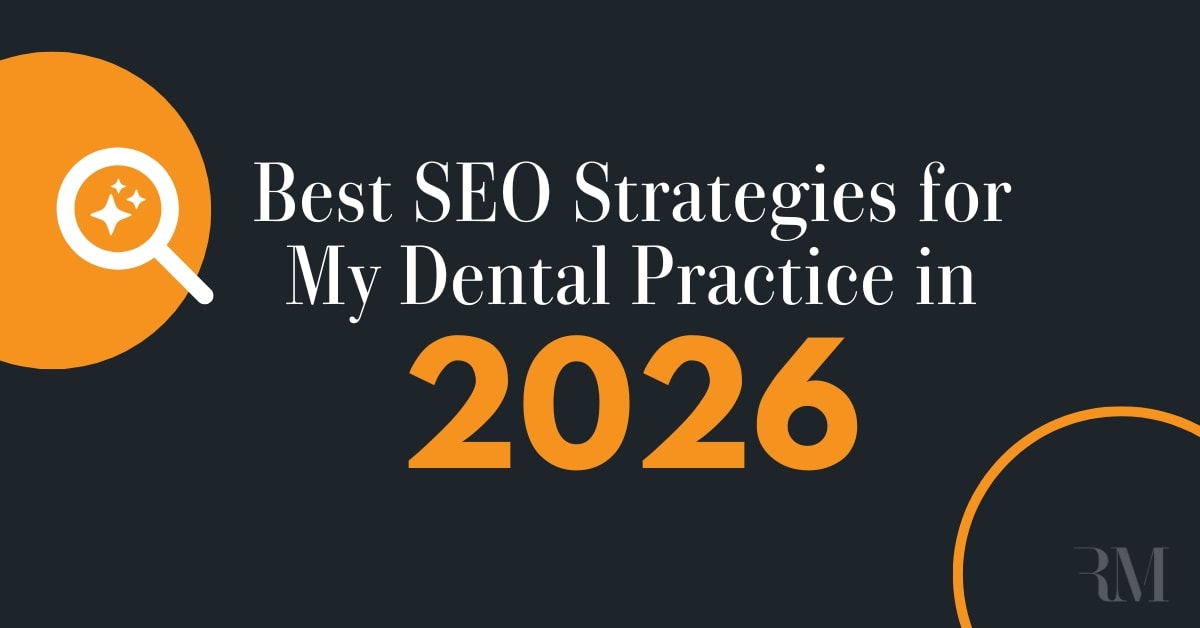SEO for Doctors and Medical Practices
With Rosemont Media’s experience and proven skills in SEO, we can help your healthcare practice gain a prominent spot in search results so you get noticed.
The goal of any search engine optimization (SEO) strategy is to increase visibility for your medical or dental website across major search engines. Achieving this requires a knowledgeable team of marketing professionals who can optimize your content and objectives through a customized strategy.
At Rosemont Media, we create sustainable SEO that follows search engine guidelines and best practices, helping you stand out from competitors in your market. Our team’s expertise spans every aspect of healthcare SEO, from designers and writers to consultants and developers — all working together to strengthen your online presence.
With most patients now beginning their search for care online, a strong digital presence has become essential to practice growth. Research shows that the majority of people use Google to evaluate doctors, compare treatment options, and review local practices before making an appointment. For this reason, SEO is no longer optiona
it is a critical driver of visibility, credibility, and new patient acquisition.
An effective healthcare SEO strategy goes beyond rankings. It positions your practice as a trusted, authoritative resource that supports patients in making important decisions. Whether someone is searching for a specific procedure, a nearby provider, or general information, appearing prominently in results builds confidence and makes a lasting first impression.
While paid advertising can deliver immediate visibility, SEO provides a long-term foundation that continues to build momentum over time. Each optimized page, original blog post, and local listing update adds to your digital footprint and strengthens your reputation. By focusing on sustainable strategies, your website can adapt to evolving search trends while continuing to attract new patients year after year.
Our team at Rosemont Media combines technical excellence with patient-centered content to deliver measurable improvements in rankings, traffic, and conversions. By investing in SEO now, you can establish a durable online presence that grows with your practice and helps you connect with more of the patients who need your care.
- What is SEO?
- Challenges of Medical SEO
- Key Elements Of SEO
- E-E-A-T in Healthcare SEO
- Website Architecture & Patient Experience
- SEO Strategy Takeovers
- Competitive SEO
- Multi-Location & Specialty SEO Strategies
- Generative Engine Optimization (GEO)
- Keywords for SEO
- Content Marketing
- Content Depth & Patient Education Hubs
- Custom Landing Pages
- Local Optimization
- Compliance, Ethics & SEO
- Link Building
- Video Optimization
- LLM Optimization & AI Search
- Tracking & Analytics
- Common Mistakes
- Future of SEO in Healthcare
- Medical SEO Cost
- Other Frequently Asked Questions
- SEO for Plastic Surgeons
- SEO for Dentists
What is Search Engine Optimization (SEO)?
SEO is the strategic approach to increasing the visibility of your website in search engine results by means of organic placement. When indexing the websites that will appear, search engines like Google and Bing use sophisticated algorithms to determine which are most beneficial for the query being asked and rank them accordingly. Many factors influence the search engine rankings, including the length of time your domain name has been active, the quantity and quality of your content, interlinking within your site and between others, and the utilization of effective keywords. No matter if you already have a website or you need to build a site from the ground up, Rosemont Media has the skills and tools to help you get discovered online.
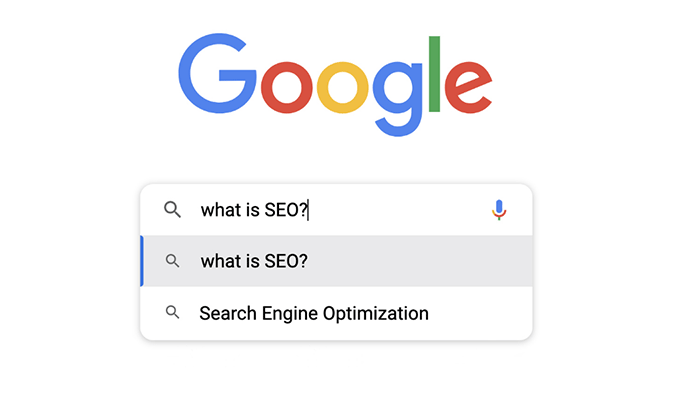
SEO Site Audits & Planning
To increase your visibility online, our SEO specialists perform comprehensive audits to identify areas that need improvement. From your website’s architecture and device compatibility to your content quality and backlink profile, an SEO audit can expose opportunities to improve your website and overall online presence. Based on our findings, we can recommend an ongoing plan to boost your site’s performance.
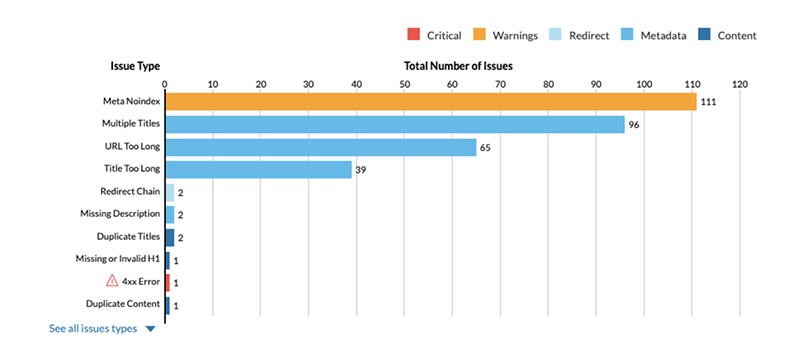
The Unique Challenges of Medical SEO
 Search engine optimization for healthcare is not the same as SEO for retail, hospitality, or other industries. Medical and dental practices face unique challenges that require a specialized approach to ensure strategies are both effective and compliant. Patients searching for care are making important health decisions, which means search engines and users alike expect a higher level of accuracy, transparency, and trust.
Search engine optimization for healthcare is not the same as SEO for retail, hospitality, or other industries. Medical and dental practices face unique challenges that require a specialized approach to ensure strategies are both effective and compliant. Patients searching for care are making important health decisions, which means search engines and users alike expect a higher level of accuracy, transparency, and trust.
One of the greatest challenges in medical SEO is compliance. Healthcare providers must adhere to HIPAA regulations that protect patient privacy, which directly impacts how information can be presented online. Similarly, elective and cosmetic practices must stay mindful of FDA guidelines when discussing treatments, technologies, or expected results. Any claims made on your website must be supported, medically accurate, and responsibly communicated. These factors make it essential to work with a marketing partner who understands the legal and ethical considerations of healthcare SEO.
Another obstacle is the balance between medical accuracy and patient-friendly communication. While doctors and dentists often rely on technical terminology, prospective patients are more likely to use conversational or simplified language when searching online. For example, someone may search “nose job recovery” instead of “rhinoplasty post-operative healing.” Optimizing for both medical and layperson terms is critical to ensure your practice appears for the widest range of relevant queries.
Recycled content is another common pitfall. Many healthcare websites unintentionally copy text from manufacturers, associations, or even sister sites. Websites with repeated or copied content may struggle to achieve strong rankings, since search engines tend to prioritize unique, high-quality content. Developing well-written pages tailored to your practice not only avoids these issues but also establishes your voice as a trusted expert in your field.
Reliability is paramount in medical SEO. Patients want to feel confident that they are choosing a qualified, reputable provider. Search engines reward websites that demonstrate credibility through elements like detailed provider bios, patient testimonials, reviews, professional affiliations, and clear contact information. Without these signals, even well-optimized websites may struggle to compete in local search results.
By addressing compliance requirements, avoiding duplicate content, and writing in patient-friendly language, practices can overcome common SEO hurdles. When handled thoughtfully, these challenges become opportunities to build credibility, strengthen trust, and stand out in competitive healthcare markets.
Key Elements of SEO
Content
Content marketing is a foundational element of successful SEO. By crafting well-researched and engaging content, you can effectively communicate your message, provide value to your audience, and enhance your website’s visibility in search engine results. Regularly updating and optimizing your content can allow it to remain fresh, align with current SEO trends, and continually attract organic traffic.
On-Page SEO
The most important aspect of a custom-designed healthcare website is the ability to be found in search engines. By optimizing your pages with effective SEO practices, you can rise above your competitors and get more traffic from prospective patients. To achieve success in your on-page SEO efforts, several elements will need to be considered. This includes meta page titles and descriptions, URL structure, content quality, interlinking, schema, and robot tags.
Off-Page SEO
While much can be done to enhance visibility on the front end of your site, quite a bit of “behind-the-scenes” work is also essential. Off-page SEO strategies can allow you to boost your site’s authority and trustworthiness, establish your brand’s credibility, and drive referral traffic. Many medical websites benefit from tools like email marketing, social media marketing, high-quality backlinks, and directory listings (e.g. on Google Business Profiles or Yelp).
Technical SEO
Your site can’t become the highly sought-after resource you want it to be if it’s not running smoothly. Our hosting service and ongoing website maintenance ensure your site is built well, loads efficiently, and operates at peak performance. As website design and functionality continue to evolve over time, our team can ensure the technical elements of your site are taken care of to maximize its potential in search engines.
E-E-A-T in Healthcare SEO
In recent years, Google has placed increasing emphasis on the concept of E-E-A-T (Experience, Expertise, Authoritativeness, and Trust). These signals help search engines determine whether a website is a reliable source of information, particularly for topics that can directly impact a person’s health and well-being. Because healthcare content falls into Google’s “Your Money or Your Life” (YMYL) category, demonstrating strong E-E-A-T is essential for earning and maintaining visibility in search results.
Experience and Expertise
Patients want to know that the information they find online comes from a qualified professional. Highlighting your credentials, board certifications, years in practice, and areas of specialization communicates expertise to both users and search engines. Experience can also be shown by including provider bios, speaking engagements, or published research — all of which reinforce your authority in the field.
Authoritativeness
Authoritativeness goes beyond individual expertise and reflects how your practice is recognized in the wider medical community. Citations in professional journals, memberships in respected organizations, and mentions on authoritative websites all serve as signals that your practice is a trusted voice. Backlinks from credible sources and media features can further strengthen this perception.
Trust
Trust is often the deciding factor for patients considering your practice. Websites that are secure (HTTPS), transparent (clear contact information, disclaimers, and privacy policies), and easy to navigate send positive signals. Patient reviews and testimonials also play a key role; they show real-world feedback and provide fresh, relevant content that search engines value.
Why E-E-A-T Matters
Healthcare websites that lack E-E-A-T may struggle to rank competitively, even if they are otherwise optimized. Search engines are cautious about surfacing content that could mislead patients or provide incomplete medical information. By showcasing your professional background, linking to credible sources, and maintaining a trustworthy online presence, you not only meet Google’s expectations but also reassure potential patients that your practice is the right choice.
At Rosemont Media, we incorporate E-E-A-T best practices into every SEO strategy we build. From highlighting provider credentials to developing authoritative content and managing online reputation, our goal is to help healthcare practices earn the trust of both search engines and patients.
Website Architecture & Patient Experience
Search engine optimization doesn’t end with keywords and backlinks. The structure of your website plays an equally important role in how both patients and search engines interact with your content. A well-organized site not only makes it easier for Google to crawl and index your pages but also ensures visitors can quickly find the information they’re seeking. In healthcare, where patients are often making important decisions under stress, a clear and intuitive experience can make the difference between booking an appointment or leaving the site.
Navigation That Works for Patients
Visitors should be able to reach essential information, like services, provider bios, contact details, and appointment options, in just a few clicks. Overcrowded menus, confusing dropdowns, or hidden procedure pages can frustrate users and increase bounce rates. Search engines take these signals into account, meaning poor navigation can indirectly impact rankings as well as conversions.
Internal Linking and Hierarchy
A logical content hierarchy helps search engines understand the relationship between your pages. Internal links guide visitors to related services, FAQs, or blog posts while signaling to Google which pages carry the most authority. For example, a landing page on cosmetic dentistry can link to dedicated procedure pages like teeth whitening or veneers, creating a clear structure that benefits both usability and SEO.
Mobile-First Design
With most patients searching for care on mobile devices, responsive design is no longer optional. Fast load times, clickable phone numbers, and easy-to-use forms are crucial for mobile users. A positive mobile experience also reinforces trust and encourages immediate action, such as calling your office or scheduling a consultation.
Patient-Centered Experience
Ultimately, good architecture is about more than technical structure; it’s about supporting patients. Organizing content by treatment category, offering accessible explanations, and including clear next steps helps patients feel informed and confident. A site designed with patient needs in mind not only performs better in search engines but also builds lasting trust.
A thoughtful website architecture balances SEO requirements with a smooth, reassuring user journey. When patients can easily navigate your site and quickly find the care they’re looking for, your practice benefits from stronger engagement, better rankings, and more meaningful conversions.
SEO and Website Strategy Takeovers with Rosemont Media
The idea of leaving one Internet marketing provider to sign with another can be unnerving. Will you have to start from scratch? Will your former company be professional and make the transition easy and painless, or will they be unhelpful and unpleasant to deal with from start to finish? Worst of all, will they sabotage your website on your way out the door in an attempt to prevent future success elsewhere? These are all extremely common concerns for medical and dental practices seeking a new online marketing direction, but the good news is, you don’t have to go through the process alone when you choose the right firm.
As a trusted industry veteran, Rosemont Media has helped numerous clients navigate successful SEO and website strategy takeovers, making sure the transition is smooth regardless of how sensitive the relationship is between a practice and their former marketing provider. Below, you can learn about key aspects of our takeover process, as well as find questions you should ask a prospective digital marketing firm before a switch.
Changing from one Internet marketing vendor to another doesn’t necessarily mean you’ll lose everything you have gained and/or created for your practice — you just have to make sure your new agency is adept and equipped to comprehensively take over your assets. When transferring your Internet marketing services to Rosemont Media, our team has the experience, tools, and in-house personnel to:
- Secure Domain Names
- Transfer Website Hosting
- Update Email Hosting and Oversee Data Migration
- Port Call-Tracking Numbers
- Evaluate and Address On- and Off-Page SEO Needs
- Assess and Improve Website Content
- Identify Missing Opportunities and Implement Solutions
No matter the specific needs of your practice, we’ll be right there to provide guidance, support, and transparency throughout the entirety of the transfer process — and well beyond.
“Rosemont has been a terrific support in our website and SEO efforts. They have the depth and knowledge to have helped us get out some search difficulties as well as to create a mobile-friendly, content rich, dynamic site. Their support staff are well trained and patient with changes and always willing to spend time developing client knowledge. One of the best things about Rosemont is that they do what they say they will do, and not just when you looking at the stats — even if you look away to manage your business, they continue on the path moving toward the agreed upon goal. So, I guess that means they are: smart, reliable, professional, consistent and very good at what they do!”
Competitive SEO for Medical Practices
The healthcare industry is one of the most competitive spaces in online search. Patients typically consider multiple providers before making a decision, and practices must contend not only with local competitors but also with national directories, hospital systems, and aggregator sites like ZocDoc or Healthgrades. To succeed, your SEO strategy must account for both the strength of nearby practices and the visibility of larger players.
Competing Against Aggregators and Chains
Aggregator websites and large healthcare networks often dominate search results because they benefit from high domain authority and extensive content libraries. However, independent practices can still compete effectively by focusing on localized, patient-focused strategies. Optimizing your Google Business Profile, targeting location-specific keywords, and creating detailed service pages that answer patient questions can help your practice stand out where it matters most — in your own community.
Understanding Local Competition
Beyond national sites, your direct competition is often the practice across town. A comprehensive competitive analysis identifies which keywords competitors rank for, where their backlinks come from, and how they structure their content. With this information, you can develop strategies to fill gaps, create stronger content, and earn visibility in areas where competitors are falling short.
Building Differentiation Through SEO
The most successful medical SEO strategies highlight what makes your practice unique. Whether it’s advanced technology, decades of experience, or a specific area of expertise, showcasing these differentiators within your content and metadata helps patients (and search engines) understand why your practice is the better choice. High-quality patient reviews, clear provider bios, and authentic photography also add legitimacy and help patients feel confident.
Success in a competitive landscape comes from more than just ranking higher. It comes from differentiating your practice with content, reviews, and reputation signals that reflect your unique strengths. A focused strategy allows independent practices to compete effectively against both local rivals and larger organizations.
Multi-Location & Specialty SEO Strategies
For practices with more than one office location or a diverse range of specialties, SEO becomes more complex. Each location and specialty introduces unique opportunities to connect with patients, but also unique challenges that must be addressed to avoid duplicate content, diluted rankings, or missed visibility in local search.
The Challenges of Multi-Location SEO
Search engines prioritize relevance and accuracy when displaying local results. If a practice operates multiple offices, each location needs its own distinct presence online. This includes individual landing pages with unique content, accurate Name/Address/Phone (NAP) details across all directories, and separate Google Business Profiles. Reusing the same content for multiple locations can cause confusion for both patients and search engines, limiting your ability to rank well.
Consistency Across Listings
Consistency is critical in multi-location SEO. Search engines rely on uniform business information across directories, social platforms, and review sites. Even small discrepancies, like different abbreviations for street names, can reduce trust and affect local rankings. Managing and monitoring this data across platforms is key to ensuring each office has the visibility it deserves.
Specialty SEO: Tailoring to Patient Intent
Different specialties attract patients with different search behaviors. For example:
- Plastic surgery patients often look for before-and-after galleries and detailed procedure descriptions.
- Dentistry patients may prioritize emergency services, family care, or cosmetic treatments, each requiring targeted content.
- Bariatric surgery patients seek long-term health information and reassurance about safety and outcomes.
- Orthopedic or dermatology patients may search by condition or symptom, making educational content especially important.
By tailoring content to match patient search intent in each specialty, practices can capture highly qualified leads and establish themselves as trusted resources.
Maximizing Visibility Across Services
Specialty SEO strategies should be built around clear navigation and dedicated landing pages. Each service deserves its own optimized page with comprehensive information, FAQs, and calls-to-action that guide patients toward booking. Interlinking these pages not only improves usability but also helps search engines understand the breadth of your services.
By creating unique, optimized content for each office and specialty, practices can build stronger visibility in local results, connect with patients searching for highly specific services, and avoid the pitfalls of duplicate or diluted content. A thoughtful multi-location and specialty strategy ensures every part of your practice has the opportunity to rank well and attract the right audience.
What Is Generative Engine Optimization (GEO)?
Generative Engine Optimization (GEO) is the process of optimizing your medical practice’s website to align with AI-powered search engines and their evolving algorithms. With the rise of AI-generated summaries and responses in search results, GEO helps ensure your website is featured prominently. By incorporating GEO techniques, you can improve visibility, attract more patients, and enhance your overall digital presence.
Below are key GEO features and how they may impact your medical practice’s online presence:
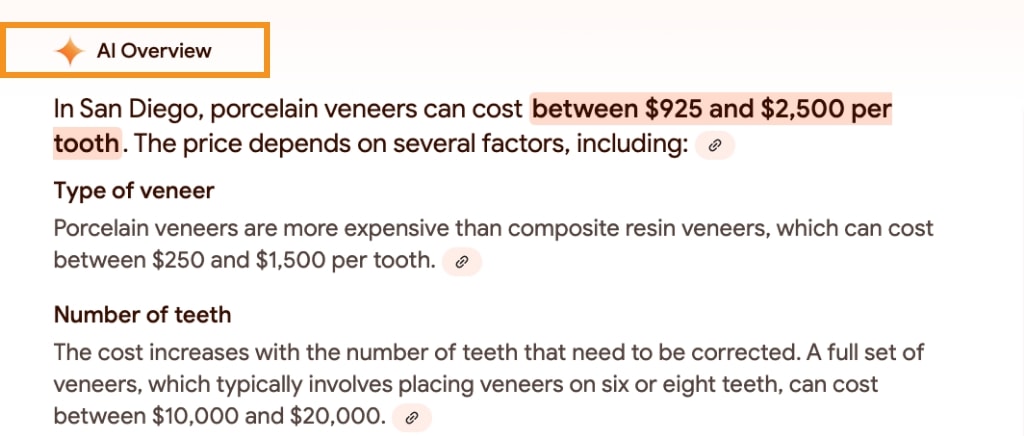
AI Overviews
Google’s AI-generated summaries provide a quick snapshot of your content. Ensuring your website’s information is accurate and up-to-date can help AI generate an engaging and informative overview of your medical services.
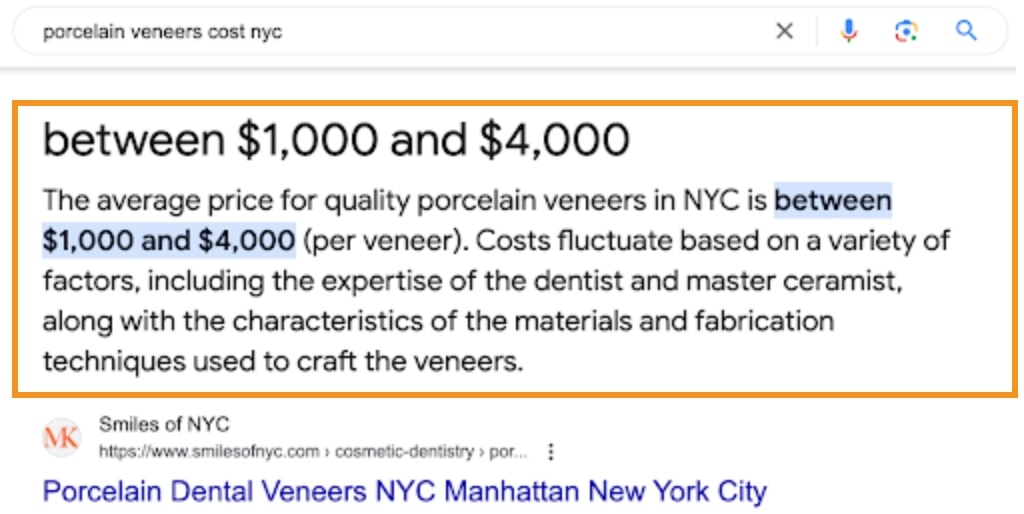
Featured Snippets
Featured snippets provide concise answers to common queries at the top of search results. Creating brief, clear responses to frequently asked medical questions can place your content in this highlighted position.
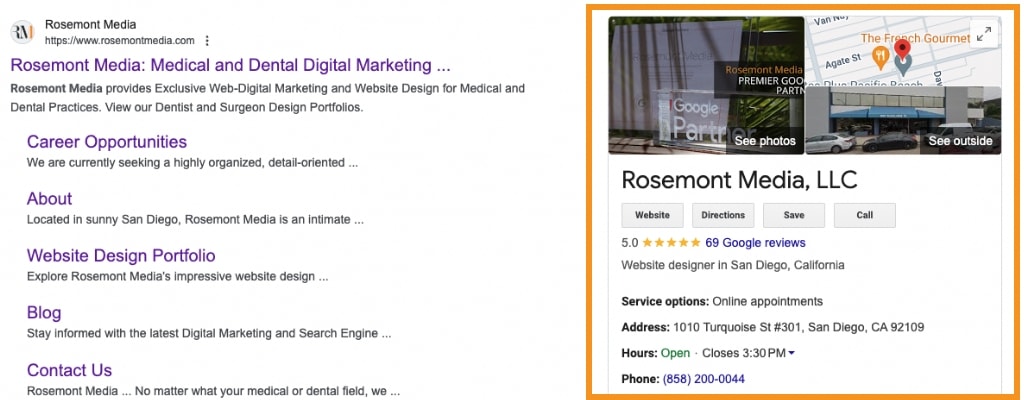
AI-Powered Knowledge Panels
These panels display detailed information about your practice directly in search results. Optimizing your online presence — such as through accurate business listings — can help showcase your credentials in these prominent spaces.
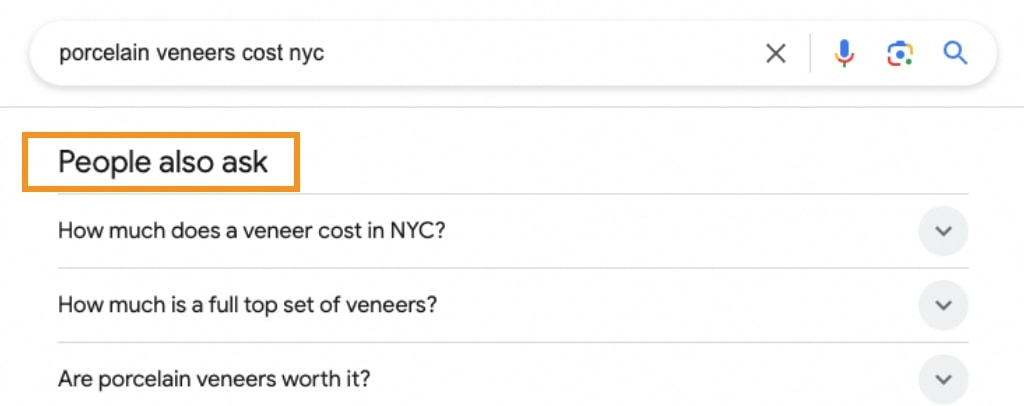
People Also Ask (PAA)
The PAA section offers users additional related questions and answers. Writing content that addresses common patient queries can increase the likelihood of your content appearing in these sections.
Voice Search Optimization
Voice search is becoming more popular, and it often uses conversational language. Optimizing your website with natural phrases and long-tail keywords can make it easier for voice search users to find your practice.
By adopting GEO strategies, your medical practice can stay ahead of AI-driven search developments, ensuring your website remains visible and accessible to patients searching for trusted care.
How to Choose SEO Keywords for Your Medical Practice
The keywords you use in your SEO efforts have a dramatic impact on how search engines view the relevancy of your site to a person’s search query. To ensure you rank well for a wide range of topics, you need to be familiar with how your target audience thinks. By staying up to date with the latest healthcare trends and the conversation surrounding them, our team can make sure your website uses popular and well-established keywords to maximize your visibility.
Content Marketing
As search engines have continued to evolve and become more advanced, a strong emphasis has been placed on creating fresh, quality, and original content. Here at Rosemont Media, we take a proactive approach to keeping your content strategy personalized and relevant. Our in-house writers are well-versed in elective healthcare treatments and services, and are dedicated to staying on top of the latest technologies and trends.
Content Evaluations & Editorial Calendar Planning
Our content strategists conduct in-depth market research, perform regular content evaluations, and execute an editorial calendar tailored to your practice’s needs. From new procedural pages and updates to blog posts and press releases, this ongoing process of delivering high-quality content communicates to Google and other leading search engines that your site is a reliable, valuable resource for online visitors. As a result, you can look forward to better search result rankings and greater visibility.
High-Quality Content & Duplicate Content Checks
As Google regularly crawls websites and evaluates the quality of their content, it’s essential that your site doesn’t “borrow” content, even from other sites you may own. Known as duplicate content, this practice can hurt your ability to rank well in search results. At Rosemont Media, our content marketing strategies emphasize original, compelling, and informative material that is naturally interspersed with helpful links in a way readers, and therefore Google, want.
To safeguard your website from duplicate content, we perform routine duplicate content checks and incorporate rewrites for this into your editorial calendar. Our seasoned writing team will work closely with you to create high-quality content for your website that covers popular topics, ultimately getting you noticed by both prospective patients and search engines alike.
Press Release Writing & Syndication
Part of your overall package with Rosemont Media includes online press releases, which are distributed locally, regionally, and/or nationally. If you have news you want to announce or simply want to share a message with a larger audience, our content marketing team can write professional press releases that enhance brand awareness and your practice’s public image.
Content Depth & Patient Education Hubs
High-quality content is the cornerstone of healthcare SEO, but success today requires more than simply publishing blog posts or procedure descriptions. Search engines prefer websites that demonstrate depth and authority on important topics. For medical and dental practices, this means developing robust content hubs that educate patients while signaling expertise and trustworthiness to Google.
Why Depth Matters
Thin content that briefly mentions a service or condition rarely performs well in competitive healthcare markets. Patients want detailed, accurate information to help them make informed decisions about their care. Search engines, in turn, favor websites that provide comprehensive answers and cover a topic from multiple angles. By building out deep, patient-focused resources, practices can establish themselves as trusted authorities.
Pillar Pages and Topic Clusters
One of the most effective approaches is to create pillar pages supported by topic clusters. A pillar page serves as a comprehensive overview of a subject (for example, “Dental Implants” or “Tummy Tuck”). Surrounding that, individual cluster pages dive deeper into related subtopics, such as implant cost, recovery timelines, or specific tummy tuck procedures. Internal links connect the cluster to the pillar, guiding patients through the content while helping search engines understand its structure.
Patient Education Hubs
Educational hubs go a step further by bringing multiple resources together in a single, accessible location. These may include FAQs, glossaries of medical terms, recovery timelines, and condition-specific guides. For patients, these hubs function as a reliable, go-to reference that answers questions and reduces uncertainty. For practices, they generate more opportunities to rank for long-tail keywords and related queries.
Balancing Accuracy and Accessibility
Healthcare content must strike the right balance between professional accuracy and patient-friendly communication. Overly technical language can overwhelm readers, while content that oversimplifies may come across as vague or untrustworthy. Effective education hubs use plain language explanations supported by medical expertise, ensuring patients feel informed without feeling lost.
The SEO Benefits
Beyond patient trust, content depth provides measurable SEO benefits. Comprehensive guides increase time on site, reduce bounce rates, and encourage patients to explore multiple pages. Each section of a hub can target different keywords, broadening your search visibility. Over time, this approach creates a content ecosystem that reinforces your authority and builds resilience against search engine algorithm updates.
Building patient education hubs requires planning and consistency, but the payoff is significant: stronger search performance, better patient engagement, and a reputation as a trusted source of information. When patients find the answers they need on your site, they are more likely to choose your practice for their care.

Custom Landing Page Creation
A landing page is a standalone page that acts like a table of contents, offering viewers an easy portal into pages and topics belonging to a specific area of your website. When used as the destination for email blasts and online ads, people can visit this page to learn more about your services and potentially complete an action, like redeeming a special or booking a consultation.
While it may seem like a pretty basic website design element, a landing page is actually much more than meets the eye. For one, it can provide a hotbed of search engine optimization value. For another, it makes the entire experience more user-friendly for the viewer. Your success will ultimately come down to how you structure your landing page and get the word out.
What’s Included on a Custom Landing Page?
To make the most of your landing page, consider what your goals are for the page. Do you want to educate readers? Direct them to other pages of interest? Convert a visitor into a patient? All of the above? The objectives for your landing page will ultimately determine what needs to be included. When done right, you can achieve a high conversion rate.
There are all kinds of ways a landing page can be presented. Some prefer lots of technological bells and whistles, while others like a more basic, streamlined approach. With that in mind, both of these landing page styles serve essentially the same purpose, and the way you present your content and design is largely dependent on your preferences.
What Are the Benefits of Using Landing Pages?
-
Linking and SEO
Interlinking, also referred to as crosslinking, to other pages within your website is a critical element of dental and medical SEO. Landing pages allow for numerous linking opportunities to other pages within your site, which can serve as an effective enhancement for your SEO strategy. They not only encourage viewers to visit more pages, but they can also introduce viewers to other procedures they may not have considered before, helping them learn about new techniques available at your practice. Not to mention the fact that it makes it easier for viewers to find what they are looking for.
-
Navigation Simplified
Now more than ever, keeping the attention of people who visit your site is no easy feat. According to statistics published by Forbes in 2023, a whopping 61 percent of users say that if they don’t find what they’re looking for within about five seconds, they’ll simply go to another site. Unfortunately, this gives doctors and dentists very little leeway in terms of visitor retention, so it’s essential to make navigating your site as easy as possible for potential patients.
If your navigation menu has no sense of order or categorization, it’s likely visitors will not have the patience to sift through every item to find what they’re looking for. Landing pages provide an umbrella for the various services and treatments marketed on your website, allowing individuals to easily locate the information they’re seeking with just a few clicks. While landing pages are a good idea for a website of any size, they are particularly beneficial for large websites, as they help to scale your information and ensure important pages don’t end up getting lost among the rest.
-
Ease of Access
The landing page groups the links for these pages together to provide the viewer with a streamlined experience and easy access to a variety of pages. If you have several pages devoted to comprehensive content on your site, you want prospective patients to be able to find them quickly and conveniently. Landing pages are an excellent way to give viewers a more easily navigable view of your practice. This is especially true in responsive website design for mobile devices.
Responsive websites allow their pages to be viewed easily across a range of digital platforms. With more and more individuals relying on their smartphones to find what they need on the Internet, it’s more important than ever to ensure your website, and the information provided by it, is as easy to access as possible.
-
Visual Elements
Landing pages allow you to provide viewers with a number of images, graphics, videos, and other visual elements that help them navigate through your website and give them a clear idea of how certain procedures can benefit them. You want your website to give viewers an inviting, easily accessible path through your practice and what you offer. Beautiful and educational imagery on landing pages help to serve that goal, providing visitors with a glimpse of many topics and avenues of information.
These are just a few examples of why landing pages are so important to modern websites. With high-quality landing pages, you are helping your viewers obtain a more positive experience while giving yourself more tools to enhance your online profile!
Local Optimization
To effectively reach current and prospective patients online, healthcare practices must be optimized for local search. With Google being a leader in local search, earning a spot in their local listings can make you stand out from your competitors. These local business listings, also known as structured citations, offer basic details about your practice (like your name, address, and phone number) to inform searchers. In addition, they have an effect on local search engine rankings, which is why establishing high-quality citations is so important for your SEO efforts.
Optimize Your Google Business Profile (GBP)
Your Google Business Profile is often the first impression prospective patients have of your practice. A fully optimized profile can boost your visibility and credibility on Google Maps. Make sure to:
- Keep Information Accurate: Verify that your practice name, address, phone number, and website URL are correct and match across all platforms.
- Select the Right Categories: Choose the most applicable categories for your healthcare services to help Google understand what you offer.
- Add Quality Visuals: Upload professional photos and videos of your facility, team, and services to help patients feel more familiar with your practice.
Build High-Quality Local Citations and Ensure Consistent NAP
NAP stands for Name, Address, and Phone number — and consistency is key. Discrepancies in your practice’s contact information across online directories, social platforms, or your own website can confuse both patients and search engines — lowering your chance of ranking well in local results.
Structured citations (business listings that include your practice’s key information) are foundational for local SEO. Beyond your Google Business Profile, it’s important to be accurately listed on other local directories and health-related platforms. Rosemont Media’s citation building and management services ensure your practice is present on the right directories and that your practice’s listings remain consistent and up to date. Through partnerships with digital tools like Yext, we can manage your listings across dozens of platforms simultaneously. This not only saves time but helps create a strong, unified online presence for your medical practice.
Gather and Manage Patient Reviews
Patient feedback not only influences others’ decisions but also plays a major role in your search ranking. Encourage satisfied patients to leave reviews on your Google profile, and take time to respond, especially to questions or concerns. Active review management helps build trust, shows your responsiveness, and contributes to overall reputation management.
Leverage Local Keywords & Backlinks
Incorporating location-based search terms into your digital content helps connect you with patients nearby. For example, a physical therapy clinic in Austin might use phrases like “Austin physical therapy” or “sports rehab near downtown Austin.”
- Local Keywords: Use them naturally within your website copy, blog posts, and metadata.
- Local Backlinks: Partner with area organizations, sponsor community events, or contribute expert content to local news outlets to build links back to your site. These signals help search engines view your practice as a trusted local authority.
Optimize for Mobile & Stay Active on Social Media
More patients are searching for care on their phones than ever before. Make sure your website is mobile-responsive, loads quickly, and includes easy navigation, clickable phone numbers, and directions to your office.
While social media doesn’t directly impact Google rankings, it plays a role in your broader local SEO strategy. Sharing helpful content, responding to patient comments, and maintaining consistent branding across platforms builds trust and increases your practice’s visibility in the community.
Compliance, Ethics & SEO
SEO for medical and dental practices must do more than attract clicks. It must also uphold the standards of patient safety, privacy, and professional integrity. Unlike many other industries, healthcare marketing is subject to strict regulations that influence how content can be written and presented. An effective SEO strategy balances the goals of visibility with the responsibility of ethical communication.
HIPAA and Patient Privacy
Protecting patient information is a top priority. Websites must avoid publishing any content that discloses protected health information (PHI) without explicit consent. Contact forms, live chat features, and online appointment tools should be HIPAA-compliant to safeguard patient data. These steps not only protect patients but also build trust by showing that your practice takes privacy seriously.
FDA Guidelines for Elective and Cosmetic Procedures
Practices offering elective services, such as plastic surgery or cosmetic dentistry, must follow FDA guidelines when describing treatments. Claims must be accurate, supported, and not misleading. Phrases that guarantee results or minimize risks can create compliance issues and damage credibility. Ethical marketing communicates benefits while also acknowledging limitations and potential risks, helping patients make informed decisions.
The Role of Disclaimers and Accuracy
Clear disclaimers reinforce transparency. Whether noting that results may vary, or clarifying that content is for educational purposes only, disclaimers help set realistic expectations. Likewise, ensuring that all content is medically accurate and up-to-date is critical. Outdated information not only weakens SEO performance but can also harm patient trust.
Why Ethics Matter for SEO
Search engines reward sites that demonstrate trustworthiness and authority. Misleading claims, duplicate manufacturer content, or non-compliant messaging can all work against both rankings and reputation. By adhering to ethical standards, practices signal to Google and to patients that their information is reliable.
Compliance and ethics go beyond legal requirements; they are essential to earning patient trust and sustaining long-term SEO success. Practices that communicate clearly, responsibly, and transparently are better positioned to build credibility online and establish lasting relationships with patients.
Link Building
A winning SEO strategy goes beyond the confines of your website. Obtaining high-quality links from other sites — especially authoritative sources like directories, review sites, and professional organizations — can signal to search engines that your website is trustworthy. Without any quality backlinks, search engines may have difficulty understanding who you are and may end up favoring other sites before yours. Our link-building strategies can communicate to Google that you’re reliable, professional, and active, which can push you closer to the front of the search results. From generating new links to removing spammy ones, we’ve got you covered.
Video Optimization
Video has become increasingly important in today’s digital landscape, and it can be one of the most effective ways for you to communicate with patients. As you strive to reach more people, Rosemont Media can help you navigate the requirements of video marketing and SEO to maximize the potential benefits for your practice. Our team will ensure your videos reach the greatest possible audience by optimizing them with proven SEO strategies.
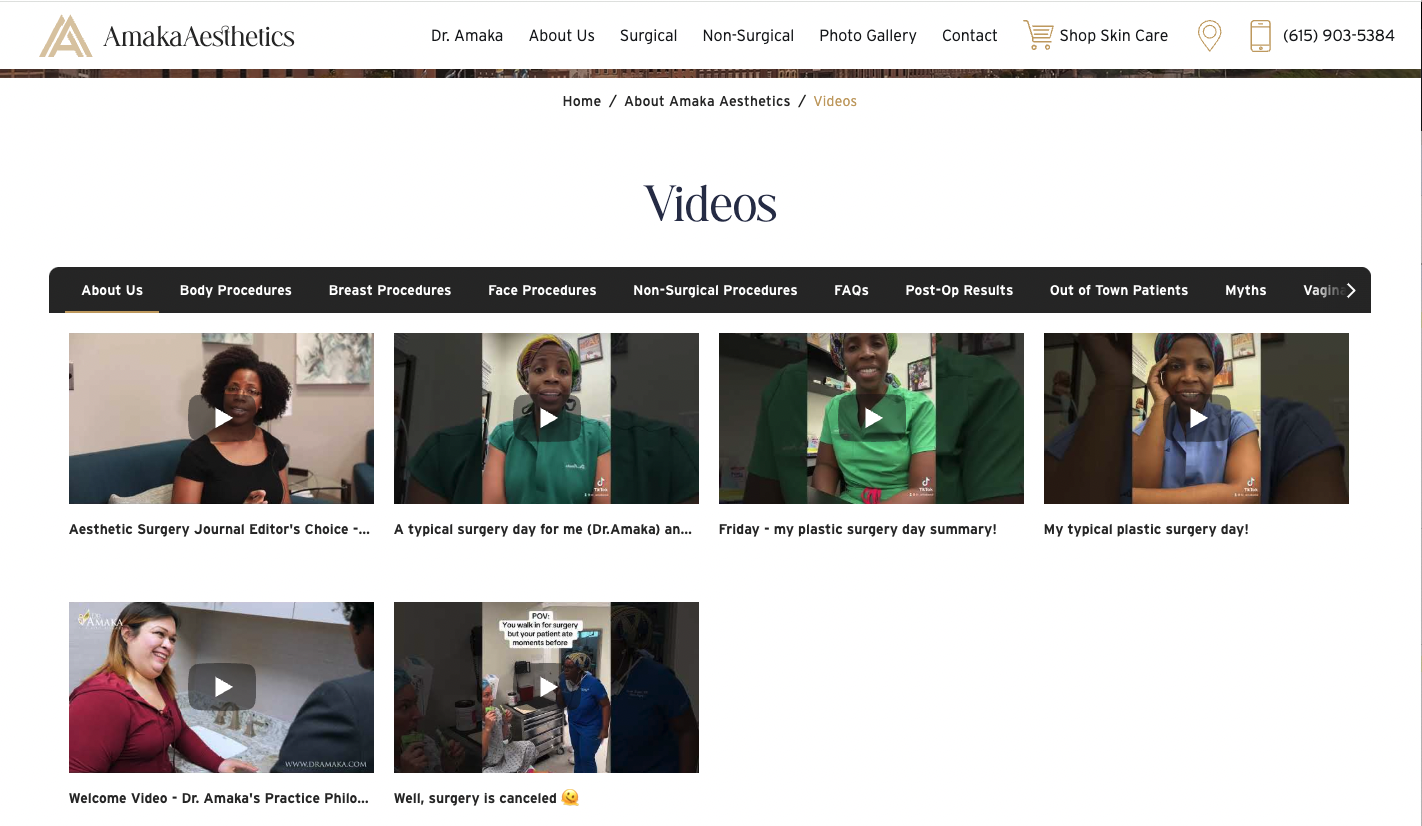

LLM Optimization & AI Search
Generative Engine Optimization (GEO) is only one part of how search is evolving. Broader advances in artificial intelligence are changing the way patients discover providers online, and practices need to prepare for what comes next. Large Language Models (LLMs) like ChatGPT, Bing Copilot, and Perplexity generate answers in a conversational format, often pulling from the most authoritative and well-structured sources available. At the same time, search platforms are expanding features like AI Overviews and People Also Ask, which highlight content that directly addresses patient questions.
Answer Engine Optimization (AEO)
Unlike traditional search results, voice assistants and AI-powered tools often provide a single “best” response. Patients may ask, “What is the recovery like after breast augmentation?” or “Who is the top dentist near me?” By structuring content to provide clear, concise, and conversational answers, your practice is more likely to appear in these direct response boxes. Incorporating FAQ sections and patient-focused language can make your website the preferred source.
LLM Optimization
Because LLMs scan vast amounts of online information, they tend to surface content that demonstrates clarity, authority, and trust. For healthcare practices, this means:
- Publishing detailed procedure pages that balance medical accuracy with patient-friendly explanations.
- Avoiding generic or duplicated content that adds little value.
- Maintaining consistent, trustworthy listings and reviews across directories and platforms.
- Updating content regularly so it reflects current standards of care and remains relevant to search engines and AI tools alike.
Why This Matters for Healthcare SEO
AI-driven results are shaping how patients make decisions long before they click through to a website. Appearing in an AI Overview, a featured snippet, or a voice assistant’s answer can position your practice as the go-to choice earlier in the decision-making process. By layering LLM and AEO strategies on top of GEO, you can maximize your visibility across both current and emerging search experiences.
At Rosemont Media, we help practices prepare for this future by integrating AI search optimization into comprehensive SEO strategies. From GEO to LLM optimization, our goal is to ensure your practice remains visible and credible no matter how search evolves.
Tracking & Analytics for Healthcare SEO
A strong SEO strategy is most effective when it can be measured. Tracking and analytics allow practices to see what’s working, where improvements are needed, and how marketing investments translate into real patient activity. For healthcare providers, the most valuable metrics go beyond simple website traffic; they focus on the actions that matter most to patients and practices alike.
Measuring What Matters
While metrics like page views and keyword rankings are useful, they don’t tell the whole story. More meaningful key performance indicators (KPIs) for healthcare SEO include:
- Phone inquiries generated from your website or Google Business Profile.
- Online appointment requests and form submissions.
- Engagement with high-value pages, such as procedure details or before-and-after galleries.
- Inquiries that come from local search results or map listings.
By focusing on these types of patient-centered KPIs, practices can better understand how SEO efforts translate into measurable growth.
The Role of Tools
Platforms like Google Analytics 4 (GA4) and Google Search Console provide insights into how users find and interact with your website. Call-tracking software adds another layer, connecting phone inquiries directly back to SEO activity. Together, these tools reveal which strategies are delivering results and where adjustments may be needed.
Continuous Improvement
SEO is not a one-time fix. It requires ongoing refinement. Regular reporting highlights which keywords are driving patients to your site, which pages convert best, and where users may be dropping off. By analyzing this data, practices can make informed updates to content, design, and navigation that improve performance over time.
Why Tracking Matters for Healthcare Practices
Patients often take multiple steps before choosing a provider. Analytics help map that journey, showing how prospective patients move from initial search to appointment booking. With this information, practices can strengthen weak points, double down on what works, and demonstrate the return on investment (ROI) of their SEO program.
Clear tracking and analytics give practices the confidence that their SEO strategy is not only improving rankings but also supporting real patient growth.
Common Mistakes in Medical SEO
Common Mistakes in Medical SEO
SEO is constantly evolving, and healthcare providers face unique risks if their strategies fall behind. While many practices understand the importance of search visibility, common missteps can hold them back from reaching their full potential. Avoiding these pitfalls can save time, protect your reputation, and create a stronger foundation for long-term success.
Keyword Stuffing and Over-Optimization
In the past, repeating keywords excessively was thought to improve rankings. Today, search engines view this as spammy behavior that can harm visibility. Content should focus on answering patient questions naturally rather than forcing keywords into every sentence.
Duplicate or Thin Content
Copying text from manufacturers, professional associations, or even other pages on your own site can make it difficult for search engines to determine which page should rank. Likewise, pages with only a few sentences of vague content often fail to provide value. Search engines favor unique, detailed material that reflects both medical expertise and patient-friendly communication.
Neglecting Mobile and Accessibility
Most patients now search for providers on mobile devices. If a site loads slowly, is hard to navigate on a phone, or lacks clickable features like tap-to-call, users will quickly move on. Accessibility issues, such as missing alt text or poor color contrast, not only create barriers for patients but can also affect SEO performance.
Low-Quality Backlinks
Links remain an important ranking signal, but not all backlinks are created equal. Links from spammy or irrelevant sites can damage credibility. A healthy link profile emphasizes quality over quantity, with earned mentions from reputable directories, organizations, and local sources.
Relying on Outdated Tactics
Shortcuts like hidden text, keyword stuffing, or link schemes may have worked years ago, but today these black hat SEO tactics risk penalties and long-term setbacks. Healthcare practices must stick to sustainable, ethical SEO practices that align with modern algorithms and patient expectations.
Avoiding these common mistakes allows practices to focus on strategies that build trust, support compliance, and deliver meaningful patient results.
The Future of SEO in Healthcare
Search is changing rapidly, and healthcare practices must stay ahead of evolving trends to remain visible to prospective patients. Traditional SEO strategies, like optimizing keywords, creating content, and building links, will always matter, but the way search engines deliver results is shifting toward more intelligent, personalized, and conversational experiences.
AI-Driven Search Experiences
Artificial intelligence is reshaping how patients find information online. Google’s AI Overviews, as well as third-party platforms like ChatGPT and Bing Copilot, deliver summarized responses that highlight trusted sources. Practices that structure their content clearly, use schema markup, and maintain accuracy are better positioned to be included in these AI-generated results.
Voice and Conversational Search
More patients are using voice assistants to ask health-related questions in natural, conversational language. This voice search trend favors content written in a clear, accessible tone with long-tail keywords and FAQ-style formatting. Optimizing for conversational queries helps practices meet patients exactly where and how they are searching.
Predictive and Personalized Results
Search engines are increasingly tailoring results to individual users based on location, search history, and intent. For healthcare providers, this makes local optimization and patient-specific content even more important. Practices that maintain consistent listings, publish relevant content, and earn positive reviews will benefit most from personalized search.
Integration with Reputation and Patient Experience
In the future, SEO will be even more closely tied to reputation. Reviews, testimonials, and social proof will continue to influence rankings as well as patient trust. Similarly, site usability, speed, and mobile experience will remain critical signals, reinforcing the connection between strong SEO and a positive patient journey.
The future of healthcare SEO will combine time-tested fundamentals with forward-looking strategies that embrace AI, voice, and personalization. Practices that adapt now will be better equipped to reach patients in a search environment that is smarter, faster, and more dynamic than ever.
How Much Does Medical SEO Cost?
The cost of medical SEO typically ranges from $1,000 to $3,000 per month. Several factors can influence this pricing, including the size and current state of your website, the level of competition in your market, and the time required for keyword research, content creation, technical optimization, and link acquisition.
While SEO is an upfront investment, it can deliver long-term benefits — such as improved visibility, stronger online credibility, and increased patient engagement. At Rosemont Media, our team tailors SEO strategies to each practice, focusing on high-quality content, analytics tracking, and beautiful, fast-loading websites that perform well in search results while also giving visitors a top-quality browsing experience.
Questions to Ask a Potential New Internet Marketing Company
By asking the right questions and insisting to view verifiable evidence of past success, you can select a company that will hold your hand every step of the way while simultaneously getting your SEO and website strategy up to speed. Based on our experience with digital marketing takeovers, the following questions and answers can help ensure your transition to a new provider is as seamless as possible.
How many consultants and/or representatives will be assigned to my account?
You want a group of seasoned professionals working together on your account. With a team approach, you can benefit from multiple helping hands attending to your needs, collective collaboration on your strategy, and optimal availability when you want to touch base.
What will you do to ensure my website won’t crash and my rankings won’t drop during the transition?
Your new marketing firm should have streamlined systems in place for website transfers, and they should explain exactly how these systems help to prevent site crashes and/or drops in ranking. It is important to also ask for examples of successful transitions they have completed in the past, preferably featuring clients who were in a position similar to your own.
How would you change my SEO strategy for the better?
Don’t let the main reason for changing marketing agencies get lost in the transition itself — you want improved SEO. Your new provider should offer a comprehensive span of web marketing services, including custom website design, content creation, link building, social media marketing, reputation management, and more. Make sure they provide an extensive overview of exactly what they offer and how they plan to personalize a strategy based on your site’s specific needs and goals. Once again, asking for examples to verify that similar tactics do indeed work is critical. It also helps to benchmark your rankings before you make a switch.
Are your designers, developers, and writers full-time and in-house, or is the work outsourced?
Not only is it essential for an online marketing firm to have personnel in these positions, but “full-time” and “in-house” are key adjectives you should listen for when a potential firm speaks about their team. The number of developers, writers, designers, and certified Google Ads managers directly impacts the workload a company can handle, and having full-time, in-house employees means your needs are not being shipped outside of the company for completion (which can result in disjointed final products).
Do you have experience working with practices in my specialty?
Similar to choosing a healthcare professional, experience is key when it comes to selecting an Internet marketing agency. You want a company that is well-versed in SEO strategy for your medical or dental specialty — and one that has demonstrable examples and results to back it up.
Does your team have experience managing all the needs of a practice my size in a similar market?
Again, request examples. Your prospective firm should be able to show you work it has done for clients of a similar size and market competitiveness. A company that claims it has the experience you seek but is unable (or unwilling) to produce evidence of its successes should draw a major red flag. Discover more signs of a questionable SEO company in our blog.
How do I know if my current SEO efforts are working?
When you enlist a professional marketing company, you should ask how they will be monitoring your SEO’s progress. Ideally, the team will be proficient in various techniques to maintain a medical site’s online presence, from conducting regular progress reports and check-ins to using tools like Google Analytics and Google Search Console. This data allows them to adjust your strategy as needed to ensure you’re getting the most out of your marketing plan.
How long does it take to see results from SEO?
In general, you can expect to see improvements in your search engine rankings and organic traffic within four to six months. That said, the exact timeline can vary depending on the competitiveness of your industry, the quality of your website, and the consistency of your SEO efforts. It's important to understand that SEO is not a one-time fix; rather, it requires ongoing efforts and patience to achieve and encourage strong results. Read more about how long it takes for medical SEO to work.
Why should I hire an SEO company for my practice?
Hiring an SEO company equips your practice with specialized expertise and resources that are essential for navigating the complexities of search engine optimization. An experienced firm should understand the latest trends and algorithms, as well as the best ways to develop a customized strategy that aligns with your specific goals. Additionally, an SEO company can provide ongoing monitoring, reporting, and adjustments to ensure that your strategy adapts and improves over time.
What role do patient reviews play in SEO?
Patient reviews play a significant role in SEO by boosting a healthcare practice’s credibility, visibility, and local search rankings. Positive reviews signal trustworthiness to both search engines and potential patients, helping your practice appear more prominently in local results. Frequent, high-quality reviews can also generate fresh content, improve click-through rates, and support keyword relevance. At Rosemont Media, we offer review and reputation management services to help practices collect, monitor, and respond to patient feedback — strengthening both your online presence and patient trust.
Should I optimize my content for voice assistants?
As voice assistants like Alexa and Google Assistant become more popular, especially via smartphones and smart speakers, optimizing your content for voice search is a smart move. People often speak in full questions, so it’s important to use natural language, answer common patient queries, and include long-tail keywords. Creating clear, conversational content also improves your chances of being featured in AI-generated summaries, snippets, and voice search results. This is part of Generative Engine Optimization (GEO) — a forward-thinking SEO strategy that helps your practice show up in today’s evolving AI-powered search landscape.
How do AI summaries affect SEO strategies?
AI-generated summaries, like Google’s AI Overviews, pull from multiple trusted sources to give patients quick answers. This means content needs to be accurate, well-structured, and patient-friendly to be considered. Practices should focus on creating clear, authoritative content that answers common patient questions, uses structured data where appropriate, and avoids duplication. Optimizing in this way increases the likelihood of being surfaced in AI-driven results.
What’s the difference between hospital SEO and private practice SEO?
Hospitals often compete with the advantage of high domain authority and large content libraries. Private practices, however, can win visibility by focusing on local optimization, specialty-specific content, and building strong trust signals like reviews and testimonials. By targeting patient intent in a specific community or service area, private practices can carve out a competitive position even alongside large hospital systems.
Should I prioritize local or national keywords?
Most practices benefit most from local keywords, since patients typically search for providers within their geographic area (e.g., “orthodontist in Dallas” or “plastic surgeon near me”). However, national or broader terms may be valuable if your practice offers highly specialized services, attracts medical tourism, or publishes educational content that serves a wider audience. An effective SEO strategy often includes a blend of both, depending on your goals.
How do reviews and reputation directly impact rankings?
Patient reviews are a key part of local SEO. Search engines view frequent, positive reviews as signals of trustworthiness, which can help improve your placement in map results and organic search. Reviews also influence patient behavior directly, as many people consider them just as important as personal recommendations. Actively encouraging and responding to reviews shows both patients and search engines that your practice is engaged and credible.
Can AI-generated content help or hurt SEO performance?
AI tools can assist with drafting ideas or supporting content development, but relying on them alone can be risky. Search engines reward content that demonstrates human expertise, trust, and originality. If AI-generated content is vague, repetitive, or inaccurate, it can hurt rankings and credibility. The best approach is to use AI tools carefully, with content always reviewed, edited, and fact-checked by professionals who understand both the medical field and patient concerns.
Better Together with Combined Services
While the various aspects of SEO, website design, promotion, and management are individually advantageous, combining a number of these elements to form an integrated marketing strategy can be exponentially more rewarding. At Rosemont Media, we can formulate a unique blend of the services your practice needs to achieve – and maintain – Internet marketing success. Contact our team to learn more!


